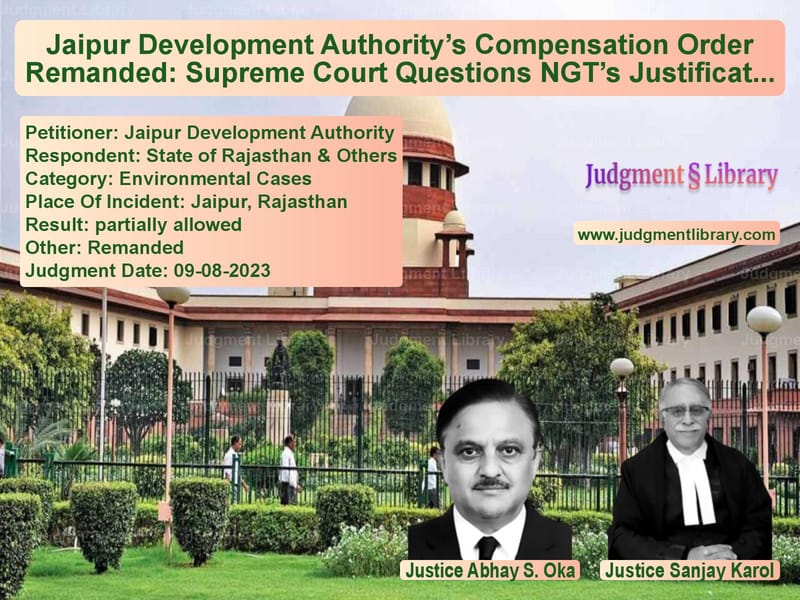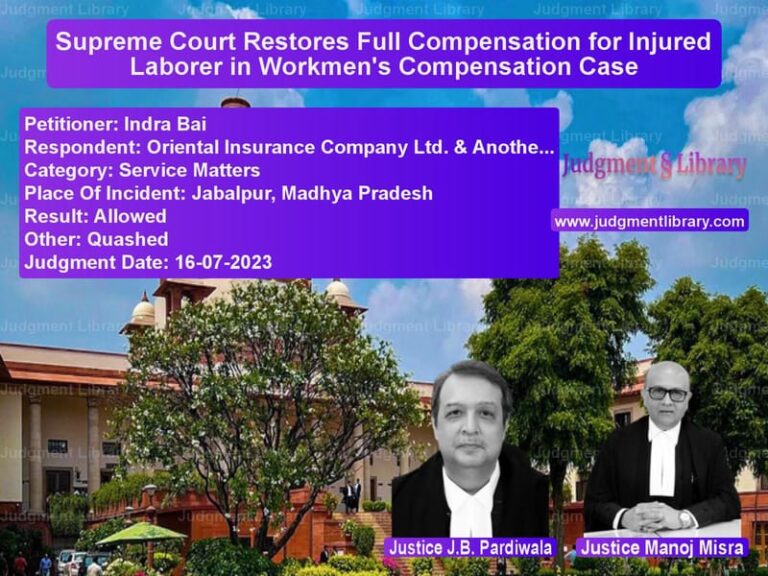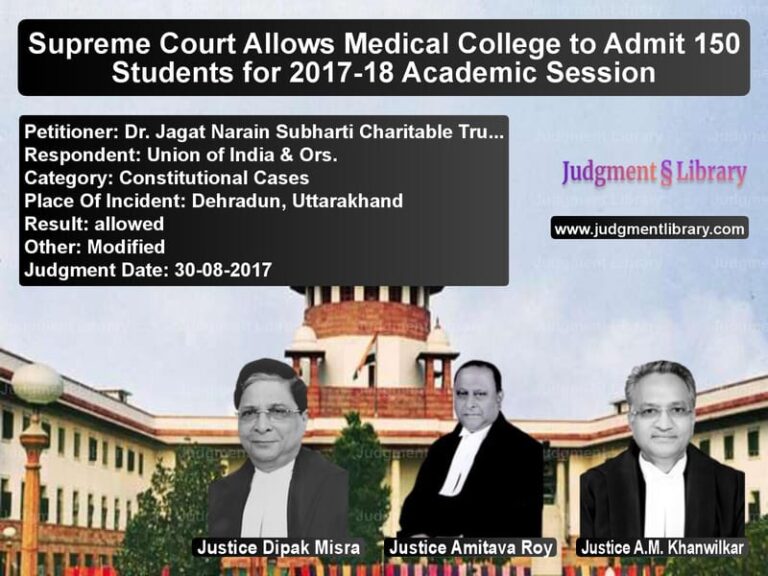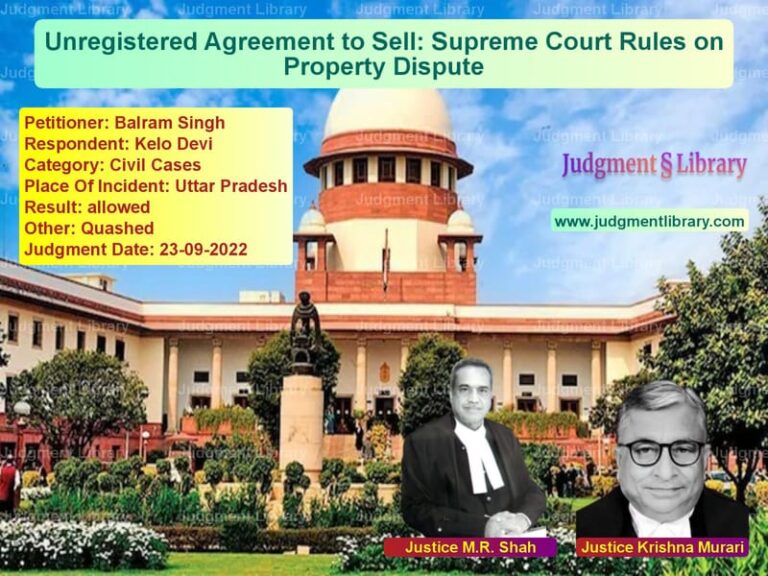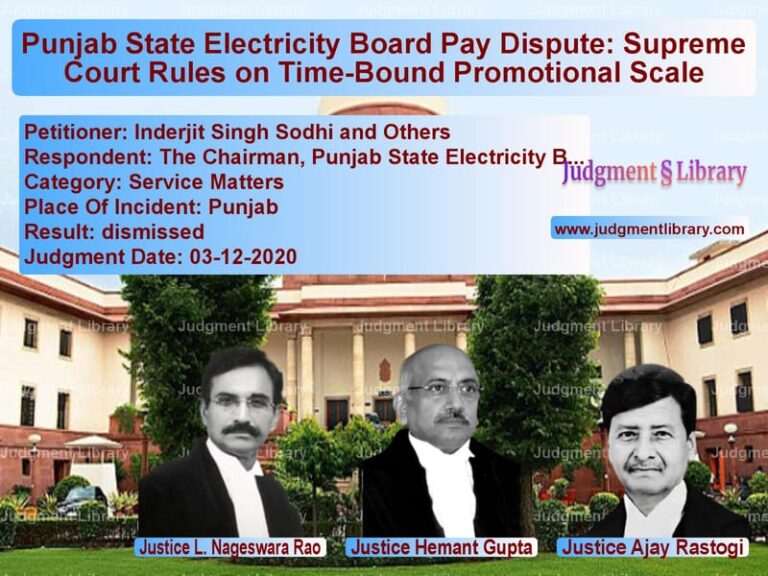Jaipur Development Authority’s Compensation Order Remanded: Supreme Court Questions NGT’s Justification
The Supreme Court of India, in the case of Jaipur Development Authority vs. State of Rajasthan & Others, addressed the issue of environmental penalties imposed by the National Green Tribunal (NGT). The case centered on the quantification of interim compensation for the non-compliance of a Sewage Treatment Plant (STP) operated by the Jaipur Development Authority (JDA). The Supreme Court ruled that the NGT had failed to provide a justified reason for imposing a Rs. 2 crore penalty, and therefore, remanded the case back to the NGT for reconsideration.
Background of the Case
The case arose from a finding by the National Green Tribunal that the Jaipur Development Authority had failed to comply with environmental norms regarding the operation of a sewage treatment plant for a period of 135 days. The NGT, while hearing the matter, imposed an interim compensation of Rs. 2 crore on the JDA.
The key concerns were:
- Whether the penalty amount imposed by the NGT was justified.
- Whether the tribunal had properly considered expert recommendations.
- The absence of recorded reasons for significantly increasing the compensation beyond expert recommendations.
Key Legal Issues
- Whether the NGT had the authority to impose an arbitrary penalty without recording proper reasoning.
- Whether the compensation assessed by the Expert Committee should have been upheld.
- The balance between environmental accountability and fair legal procedures.
Arguments by the Petitioner (Jaipur Development Authority)
The Jaipur Development Authority, through its counsel, argued:
- The JDA had already deposited Rs. 33.75 lakh as per the expert committee’s recommendation.
- The NGT did not provide any logical reasoning for imposing a penalty of Rs. 2 crore.
- The tribunal failed to explain why the expert committee’s report was disregarded.
- The STP’s non-compliance was only for 135 days, and the penalty was excessive compared to similar environmental violations.
Arguments by the Respondent (State of Rajasthan)
The respondents maintained that:
- The JDA had failed to meet pollution control standards, warranting strict penalties.
- The NGT had the power to impose fines beyond the expert committee’s recommendations if deemed necessary.
- The interim penalty was justified to deter future environmental violations.
Key Observations by the Supreme Court
The Supreme Court analyzed the order passed by the NGT and made the following observations:
1. Lack of Justification for the Rs. 2 Crore Penalty
“There is absolutely no reason recorded by the Tribunal for coming to the conclusion that the appellant is liable to pay a sum of Rs. 2,00,00,000/- (Rupees two crores) towards the interim compensation.”
The Court noted that the NGT had failed to provide any reasoning for imposing such a high amount.
2. Disregard of the Expert Committee’s Recommendations
“The Committee of Experts proposed compensation of Rs. 33,75,000/- (Rupees thirty-three lakhs seventy-five thousand), which the appellant has deposited.”
The Court emphasized that the NGT did not explain why it rejected the expert committee’s report and imposed a much higher fine.
3. Need for Reconsideration by the NGT
“As no reasons have been recorded for arriving at a figure of Rs. 2,00,00,000/-, we propose to remand the case to the National Green Tribunal for reconsideration.”
The Court ruled that the NGT must properly evaluate the penalty and justify its decision based on legal and factual considerations.
Final Judgment
Based on the above findings, the Supreme Court ruled:
“We set aside only that part of the paragraph 8 of the impugned judgment by which a direction was given to the appellant to deposit a sum of Rs. 2,00,00,000/- (Rupees two crores) by way of interim compensation.”
The Court remanded the case to the National Green Tribunal with a directive to re-evaluate the penalty amount based on fair legal principles.
Conclusion
The Supreme Court’s ruling in Jaipur Development Authority vs. State of Rajasthan & Others underscores the importance of reasoned decision-making in environmental penalty cases. While the judiciary supports strict enforcement of environmental regulations, it also mandates that penalties must be imposed with clear justification. The judgment sets an important precedent for cases where regulatory bodies impose fines without sufficient reasoning.
Petitioner Name: Jaipur Development Authority.Respondent Name: State of Rajasthan & Others.Judgment By: Justice Abhay S. Oka, Justice Sanjay Karol.Place Of Incident: Jaipur, Rajasthan.Judgment Date: 09-08-2023.
Don’t miss out on the full details! Download the complete judgment in PDF format below and gain valuable insights instantly!
Download Judgment: jaipur-development-a-vs-state-of-rajasthan-&-supreme-court-of-india-judgment-dated-09-08-2023.pdf
Directly Download Judgment: Directly download this Judgment
See all petitions in Environmental Cases
See all petitions in Public Interest Litigation
See all petitions in Judgment by Abhay S. Oka
See all petitions in Judgment by Sanjay Karol
See all petitions in partially allowed
See all petitions in Remanded
See all petitions in supreme court of India judgments August 2023
See all petitions in 2023 judgments
See all posts in Environmental Cases Category
See all allowed petitions in Environmental Cases Category
See all Dismissed petitions in Environmental Cases Category
See all partially allowed petitions in Environmental Cases Category

